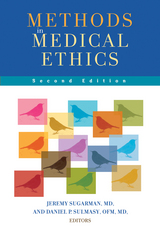
Medical ethics draws upon methods from a wide array of disciplines, including anthropology, economics, epidemiology, health services research, history, law, medicine, nursing, philosophy, psychology, sociology, and theology.
In this first book to systematically examine, critique, and challenge some of these disciplines and their methods in light of their influence on medical ethics, leading scholars present particular methods that have played significant roles in the field. The methods addressed include philosophy, religion and theology, professional codes, law, casuistry, history, qualitative research, ethnography, quantitative surveys, experimental methods, and economics and decision science. Reviewing each, they provide descriptions of techniques, critiques, and notes on resources and training. Physician-assisted suicide and euthanasia are used as an illustration of the richness of multidisciplinary work applied to individual issues. Similarly, genetic testing is used as an example of how multiple descriptive methods may privilege certain findings.
Methods in Medical Ethics is a valuable resource for scholars, teachers, editors, and students in any of the disciplines that have contributed to the field. As a textbook and reference for graduate students and scholars in medical ethics, it offers a rich understanding of the complexities of both moral questions and their answers.

Medical ethics draws upon methods from a wide array of disciplines, including anthropology, economics, epidemiology, health services research, history, law, medicine, nursing, philosophy, psychology, sociology, and theology.
In this influential book, outstanding scholars in medical ethics bring these many methods together in one place to be systematically described, critiqued, and challenged. Newly revised and updated chapters in this second edition include philosophy, religion and theology, virtue and professionalism, casuistry and clinical ethics, law, history, qualitative research, ethnography, quantitative surveys, experimental methods, and economics and decision science. This second edition also includes new chapters on literature and sociology, as well as a second chapter on philosophy which expands the range of philosophical methods discussed to include gender ethics, communitarianism, and discourse ethics. In each of these chapters, contributors provide descriptions of the methods, critiques, and notes on resources and training.
Methods in Medical Ethics is a valuable resource for scholars, teachers, editors, and students in any of the disciplines that have contributed to the field. As a textbook and reference for graduate students and scholars in medical ethics, it offers a rich understanding of the complexities involved in the rigorous investigation of moral questions in medical practice and research.

In Replacement Parts, internationally recognized bioethicist Arthur L. Caplan and coeditors James J. McCartney and Daniel P. Reid assemble seminal writings from medicine, philosophy, economics, and religion that address the ethical challenges raised by organ transplantation. Caplan's new lead essay explains the shortfalls of present policies. From there, book sections take an interdisciplinary approach to fundamental issues like the determination of death and the dead donor rule; the divisive case of using anencephalic infants as organ donors; the sale of cadaveric or live organs; possible strategies for increasing the number of available organs, including market solutions and the idea of presumed consent; and questions surrounding transplant tourism and "gaming the system" by using the media to gain access to organs.
Timely and balanced, Replacement Parts is a first-of-its-kind collection aimed at surgeons, physicians, nurses, and other professionals involved in this essential lifesaving activity that is often fraught with ethical controversy.
READERS
Browse our collection.
PUBLISHERS
See BiblioVault's publisher services.
STUDENT SERVICES
Files for college accessibility offices.
UChicago Accessibility Resources
home | accessibility | search | about | contact us
BiblioVault ® 2001 - 2024
The University of Chicago Press









